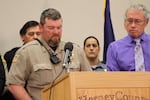
An FBI checkpoint outside the Malheur National Wildlife Refuge on Jan. 28, 2016.
Bradley W. Parks / OPB
Andy and Vena Dunbar have spent the past six days living within a no man’s land inside the FBI checkpoints that now surround the Malheur National Wildlife Refuge headquarters.
“We’re psychologically exhausted,” Andy Dunbar said. “For most of this week we’ve felt that we haven’t been getting any support. We’ve basically felt like we’ve needed to protect ourselves."
Their 400-acre ranch is directly adjacent to the refuge, which puts them closer to the four remaining armed militants than to law enforcement.
Some of their neighbors have quietly left town, hoping to return to homes and property intact. But others, like the the Dunbars, who have cattle to feed and a ranch to tend, don’t have that option. Law enforcement has stayed away from their property, despite 911 calls the ranching couple made earlier this week.
Tuesday, Jan. 26 was an especially tense night for the Dunbars. That’s when Ammon Bundy was arrested and LaVoy Finicum was shot and killed by Oregon state troopers. The events set the remaining occupiers into a frenzy, wondering what to do. Some fled through Dunbar’s property. He confronted one militant on his property, who Dunbar described as being in “panic mode.”
“It turned into a whole different set of rules up here,” Dunbar said. “They were scared, they were panicking and they were desperate.”
At 2 a.m Wednesday, he got a call from his nearby son who said a number of vehicles were approaching his house from the refuge. He could see car lights coming toward them.
He told his wife to keep the lights off and to call 911. The vehicles pulled up in front of his house and several people emerged, 30 feet from his front door. Terrified, his wife stayed on the phone with 911 dispatch.
“I didn’t know what was to stop them from maybe thinking ‘maybe we could have some hostages,” Dunbar said. “Desperate people do desperate things.”
Dunbar said the 911 dispatcher advised them to stay in the house and not to confront the trespassers. He said he was hoping they’d send a deputy.

“We could have waited a lot longer," said an emotional Harney County Sheriff David Ward, referencing the arrest of militant leaders, "but this has been tearing our community apart.”
Bradley W. Parks / OPB
ldquo;They said basically we’re kind of on our own,” Dunbar said. “I really don’t feel that protected from our sheriff’s department, I’m sorry.”
The trespassers eventually got back into their rigs and left. The Dunbars didn’t sleep much of the rest of the night, worrying that more militants might sneak onto their property. Andy Dunbar sat awake, peering through his windows, at the moonlit fields of sage and snow, watching for signs of intruders.
Keeping far away from the refuge was seemingly part of law enforcement’s hands-off strategy to prevent an escalation with the militants since the beginning of the occupation.
“We’ve done everything we could to prevent from sparking something,” said Harney County Sheriff Dave Ward. He told OPB that he feels bad the Dunbars felt unprotected by his department.
“Our goal has been to provide the absolute best coverage we can to the community,” Ward said.
Dunbar was frustrated that he never heard directly from Ward or Judge Steve Grasty about the occupation.
“It’s kind of like we’re in the old west again. I guess we just got to defend ourselves,” Dunbar said.
Ward told OPB that he’s been overwhelmed with responding to calls and other duties since the occupation began.
Throughout the occupation Dunbar remained relatively quiet, even though as the closest property owner, the activities of the militants had the potential to have the biggest effect on him. Like many local ranchers, he disagrees with the occupiers’ anti-federal government sentiments.
“We’ve worked for over 20 years to get to the point where we could sit down with the federal government and the state all in the same room and work out things,” Dunbar said. “This whole deal was like a slap in the face for those of us who have worked for years to try and make a difference.”

“The armed occupiers were given ample opportunities to leave peacefully … They chose, instead, to threaten the very America they profess to love with violence, intimidation and criminal acts,” said Greg Bretzing, the FBI's special agent in charge.
Bradley W. Parks / OPB
Early in the occupation, Dunbar told the occupiers they were not allowed on his land. He said for most of the month, they were respectful of him and his property. But the tone of the occupation changed after Tuesday night’s arrests and the death of Finicum.
Dunbar appreciates having FBI agents nearby now that the checkpoint is closer to his home. He spoke with checkpoint agents and described them as friendly and reassuring. But he said it’s still been stressful living out these days between the FBI perimeter and the remaining armed occupiers.
“There are not that many guys over there now, but the ones left, they’re not the best of the best. I don’t know what they’re capable of,” Dunbar said. “So we still got to be vigilant.”